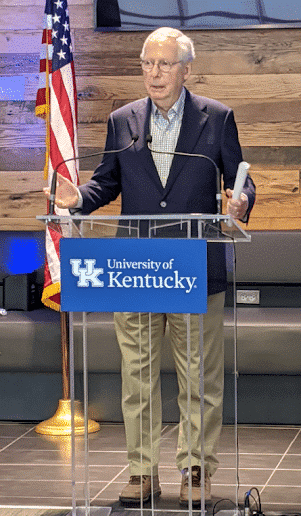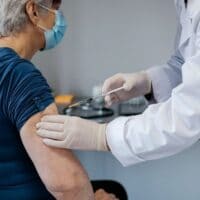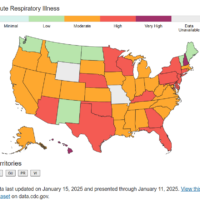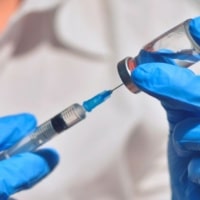After touring the mass-vaccination site at the University of Kentucky’s Kroger Field Monday, U.S. Senate Republican Leader Mitch McConnell urged Kentuckians to get vaccinated, especially Republican men, who polls have found are some of the most reluctant to get a shot.
“I saw on some program last week that Republican men, curiously enough, might be reluctant to take the vaccine,” McConnell said, understating.

Pointing an index finger upward, he said, “I’m a Republican man, and I want to say to everyone, you need to take this vaccine. These reservations need to be put aside, because the only way I think to get, to finally put this pandemic in the rearview mirror, is with herd immunity … 75% of us need to take this vaccine.”
As McConnell spoke, only 41% of Kentuckians 16 and older had received at least one dose of a vaccine, and the state had just opened vaccinations to residents 16 and up. Gov. Andy Beshear said at his Monday briefing that would add upwards of 1.3 million more people to the official eligibility list.
McConnell said, “So, we have a ways to go if we are gonna all really be back to normal by this summer. We still have a way to go here in Kentucky and all across America to get those shots in arms over the next few months.”
Asked why he thought there was so much vaccine hesitancy among Republican men, and if Donald Trump’s presidency played a role in it, McConnell said he didn’t know the reason for it.
An NPR/PBS/Marist College poll released earlier this month found that only 20% of Republican men said they have been vaccinated, and 49% said they would refuse a vaccine if it was offered.
Asked by Kentucky Health News if he still had “total” confidence in Dr. Anthony Fauci, which he told KHN when asked likewise in mid-July, he said, “Yes, I think he’s the principal person we’ve relied on for the last couple of years. He’s become somewhat controversial, I gather, but we have to take advice from somebody. And for myself, looking at his history and background, he’s the most reliable witness I’ve seen.”
Kentucky’s other senator, Republican Rand Paul, has frequently clashed with Fauci, director of the National Institute of Allergy and Infectious Diseases, and challenged his wearing of masks after vaccination.
Women outnumber men in Kentucky vaccinations by 4 to 3, Gov. Andy Beshear said at his news briefing later in the day. The report he cited does not provide information about political leanings.
Asked about this disparity among men and women, and in particular about the reluctance of Republican men to get vaccinated, Beshear praised McConnell for following public-health measures throughout the pandemic, for getting vaccinated, and for encouraging others to do so.
“The data we see says that overall men are more hesitant than women, and Republican men are more hesitant than virtually anybody else,” said Beshear.” To me, I want everybody to get the protection that a vaccine provides. It protects the Republican man as much as it protects anybody else.”
Beshear stressed the value of political leaders encouraging vaccinations, and said he had sent a letter to the state’s congressional delegation, asking them to do that, especially among Republicans and Republican men. All in the delegation are Republicans except Rep. John Yarmuth, D-Louisville.
“There are some that may not listen to anybody, or there may be some who only listen to one person out there. We really need them to open their minds and open their hearts,” Beshear said. “You know, to me, being vaccinated was following the science, but it was also following my faith and knowing that it can protect those around me.”
Melissa Patrick is a reporter for Kentucky Health News, an independent news service of the Institute for Rural Journalism and Community Issues, based in the School of Journalism and Media at the University of Kentucky, with support from the Foundation for a Healthy Kentucky. She has received several competitive fellowships, including the 2016-17 Nursing and Health Care Workforce Media Fellow of the Center for Health, Media & Policy, which allowed her to focus on and write about nursing workforce issues in Kentucky; and the year-long Association of Health Care Journalists 2017-18 Regional Health Journalism Program fellowship. She is a former registered nurse and holds degrees in journalism and community leadership and development from UK.






